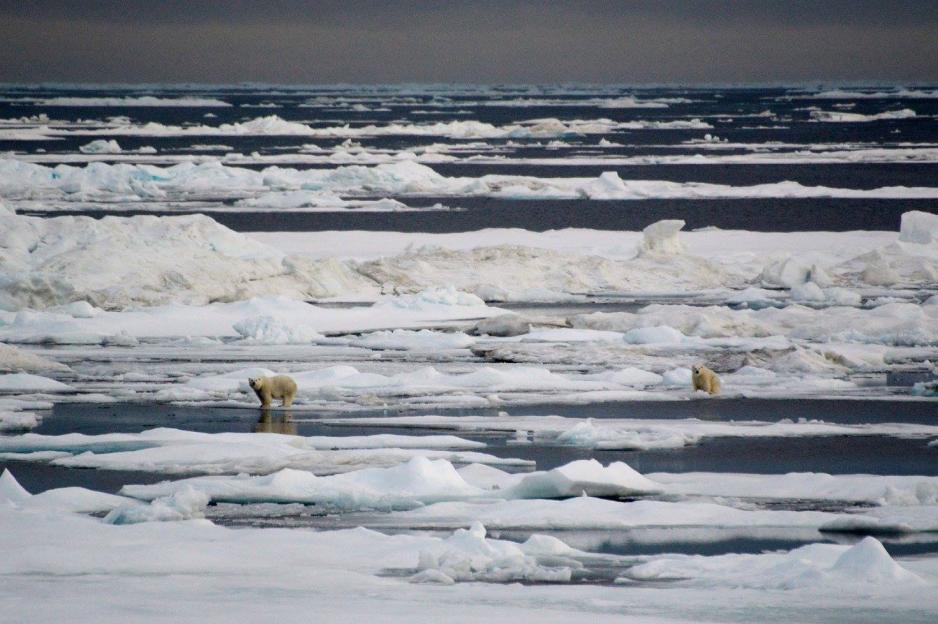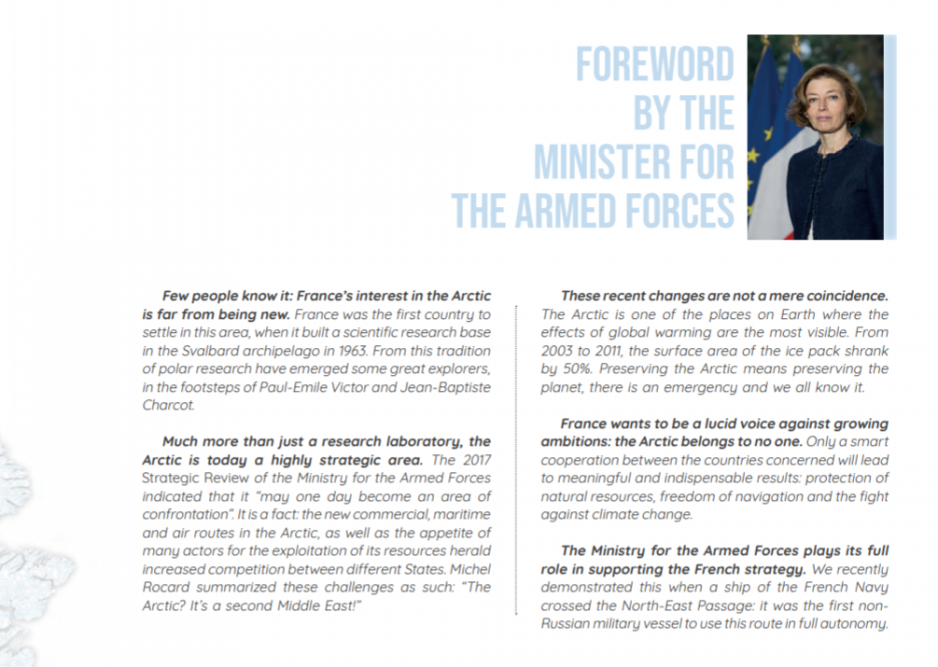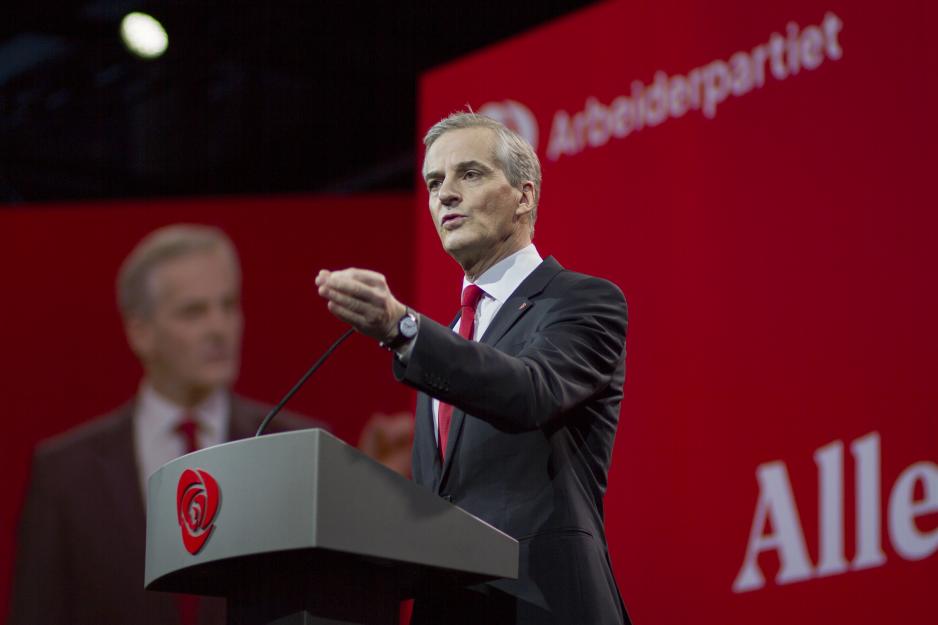France Compares the Arctic to the Middle East, Claims Region Belongs to No-One

The Arctic belongs to no-one. And only cooperation between states will lead to meaningful results, says France’s Arctic strategy, signed by the Minister for the Armed Forces. Photo: Kim Kenny
France is very clear in a new strategy document: The Arctic belongs to no-one. – This is a remarkable statement and likely to baffle Norway, says researcher.
The remarkable statements can be found in the preamble to France and the new strategic challenges in the Arctic, the new French Arctic strategy, signed by the Minister for the Armed Forces, Florence Parly.
- The Arctic is far more than a research lab; it is a separate strategic area. The strategic review from 2017 indicated that the Arctic “one day could become an area of confrontation”. That is a fact: The new commercial maritime routes in the Arctic as well as many actors’ appetite for resource exploitation leads to increased competition between various states. Michel Rocard (former French prime minister, journ.note) summarized these challenges as follows: “Arctic? It is the new Middle East!”, she writes.
It further says that “France will be a clear and unequivocal voice against growing ambitions. The Arctic belongs to no-one. And only cooperation between states will lead to meaningful results”.

Facsimile from the new French Arctic Strategy, signed by Florence Parly, the French Defense Minister.
- Catches Norway by surprise
Svein Vigeland Rottem, researcher at the Fridtjof Nansen Institute and expert on Arctic politics argues that the French statements are remarkable.
- This is quite remarkable and will probably come as a surprise to the Norwegian Ministry of Foreign Affairs, which has worked long and hard to defuse the idea of the Arctic as a conflicted region, Rottem says to High North News.
He stresses that he has not read the French strategy, and there often will be a difference between rhetoric phrases versus what countries actually do in practice. Nevertheless, Rottem argues that the idea of protecting parts of the Arctic is not new and that it appears to be heading back into the discourse.
- Sweden and Finland in particular have spoken about protected zones in the Arctic to a greater extent than the [Arctic] coastal states.
- Why does France say this?
- If I were to attempt a careful analysis, this probably has to do with the idea about an Antarctic Treaty for the Arctic. There appears to be a widespread understanding of the Arctic as having many of the same capacities as Antarctica. But that is wrong; the Arctic is an ocean and it is regulated under the UN Convention on Law of the Seas (UNCLOS). Antarctica is a quite different matter altogether. Arctic costal states will probably think that this is a surprising and rather unfortunate rhetoric, Rottem says and adds:
- One should perhaps also look at who the messenger is in this case. The French MFA does not necessarily agree with the MoD. I do not know how well coordinated such a statement might be.
- Are there many countries that argue that no-one owns the Arctic?
- Not amongst the countries operating in the Arctic or having knowledge of it. However, the debate about balance between protection and exploitation is there. It was rather heated some ten years ago and is clearly reappearing, Rottem says.

Labor leader and former Norwegian Minister of Foreign Affairs Jonas Gahr Støre. Photo: Sandra Skillingsås/the Labor Party
The Arctic is not a land without owners, argues former Norwegian Minister of Foreign Affairs Jonas Gahr Støre. He says this is “words we’ve hard from France for years now”, however, argues that the coastal Arctic states hold their clear responsibilities according to UNCLOS.
- The French response to that will probably be that it does not contest the responsibilities and rights of the coastal states, and that they by ‘the Arctic’ here refer to areas around the North Pole point, beyond the coastal states’ zones. Nevertheless, this tendency to refer to the Arctic as the world’s last no-man’s land is something Norway as well as the rest of the Arctic Council should clearly oppose. The Arctic is an ocean like any other, even though it is covered with ice for parts of the year. The UNCLOS is in force and we adhere to it, Støre says.
While being foreign minister, Støre repeatedly met with former [French] prime minister Michel Rocard, who at the time was France’s Arctic ambassador.
- Rocard had a view on the Arctic against which I would mark my opposition at every opportunity. Besides, France has professional communities that Norway should want to actively cooperate with when it comes to polar conditions. Our European partners as well as our allies having a correct image of the current status of the Arctic and our High North is our own interest, Støre says.
France heavily involved in Arctic industry
In the French strategy, the potential for conflict and security problems is related to increased tourism and more commercial activity in the region.
Several French companies operate in the Arctic. There is for instance Ponant, planning to send ‘Le Commandant Charcot’, the world’s first cruise ship with icebreaker capacity, to the North Pole in 2021.
French-owned Total also owns 20 percent of Yamal LNG and a further 10 percent of Arctic LNG2, two giant liquefied natural gas production sites in Northern Siberia, Russia.
This article was originally pubished in Norwegian and has been translated by HNN's Elisabeth Bergquist.


